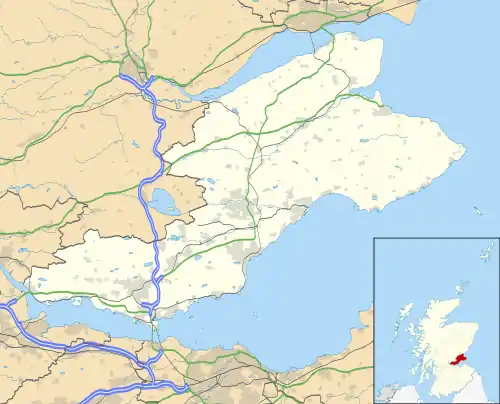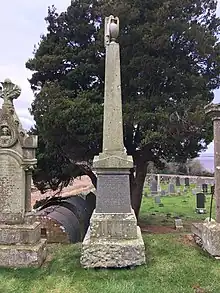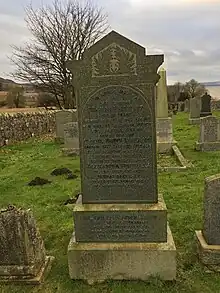| Gauldry | |
|---|---|
 Gauldry's local post office and general store | |
 Gauldry Location within Fife | |
| Population | 650 (mid-2020 est.)[1] |
| OS grid reference | NO3624 |
| Council area | |
| Lieutenancy area | |
| Country | Scotland |
| Sovereign state | United Kingdom |
| Post town | NEWPORT-ON-TAY |
| Postcode district | DD6 |
| Dialling code | 01382 |
| Police | Scotland |
| Fire | Scottish |
| Ambulance | Scottish |
| UK Parliament | |
| Scottish Parliament | |
Gauldry, locally sometimes The Gauldry,[2] is a village in Fife, Scotland. It is located 3 kilometres (1.9 mi) southwest of Newport on Tay, 2 kilometres (1.2 mi) south-east of Balmerino, and 1 kilometre (0.62 mi) south of Bottomcraig.[3]
The village is home to Balmerino Primary School and the Morison Duncan Hall. A pop-up post office operates on Wednesdays in the Morison Duncan Hall where all post office services are provided.[4][5]
Etymology
The name derives from the Scots "gallow raw", the row of houses leading towards the gallows on Gallow Hill to the east.[2][6]
History
The earliest known written mention of Gauldry can be found in a charter issued between 1328 and 1332 by John De Haya, the Lord of Naughton, in which he grants the monks of Balmerino Abbey a plot of his land lying west of Gauldry. In this charter the village is referred to as Galuran.[7][8]
An ancient road connecting Balmerino to Strathkinness passed through Gauldry. Significant segments of the road survive today: Naughton Brae (known locally as The Stoney) in the north of the village and the straight dirt path on the western edge of Dandies Wood in the south. In the 13th century this road was used by the monks of Balmerino Abbey to transport stones from a quarry in Strathkinness that they were granted access to at some point between 1227 and 1250. The road likely acted as a highway to St Andrews and was most likely the road used by Queen Mary on her journey from Balmerino to St Andrews in 1565.[9][10]
On the far east side of the village on what is now Priory Road stands what was once called Gallow Hill.[11] According to Rev James Campbell, the sixteenth minister of Balmerino, Gallow Hill is likely the place where the Barony of Naughton were executed.[8]
Much of the land Gauldry sits on was originally a moor. The vast majority of houses present in the village were built in the past two hundred years with the trade buildings historically clustered in the west end. Weaving was one of the most common professions.[10]
Numerous private schools have existed in the village, though Balmerino Primary School has remained the only school in the village since its relocation from Bottomcraig in 1830. Gauldry Parish Church, previously a weaver's shop, entered into use as a church in 1843 when a newly-formed congregation under the Free Church of Scotland began congregating there. The parishioners in the village have historically attended the several parish churches that have existed in Balmerino, Kirkton, and Bottomcraig. Balmerino Parish Church in Bottomcraig has been the parish church since its construction in 1811. The Morison Duncan Hall was built in 1897.[10]
19th century
In 1830, the parish school located in Bottomcraig was relocated to Gauldry to a newly constructed building where it has since remained.[12] It is located north of the Main Road in the west of the village. The first headteacher was Mr William Ballingall, a University of St Andrews alumnus who remained in this position for more than fifty years until his death in 1882.

The Gauldry church was started during the Great Disruption of 1843 when a newly-formed congregation in connection with the Free Church of Scotland began to congregate in the building under the ministry of Andrew Melville.[10] The congregation gathered in the church building on the Main Road which was a weaver's shop at the time.[14][15]
Andrew Melville, the original minister, had seceded from the nearby village of Logie. A manse and a free church were erected for him there. He performed the duties of both the Gauldry and Logie congregations until his death in 1848. He was succeeded by George R. Sommerville in 1852 when the Gauldry and Logie churches united.[10]
The Morison Duncan Hall was built in 1897 to the east of the school for use as a village hall and reading room. It was built in memory of Mrs Morison-Duncan by her daughter Mrs Anstruther-Duncan two years after her mother's death.[10][16]
20th century
Since the inception of the Gauldry church it has transferred multiple times between denominations: in 1900 it transferred to the United Free Church of Scotland and then in 1929 to the Church of Scotland.[15] In 1937 the church merged with the Balmerino Parish Church.[17]
During this century, the village underwent major growth with the number of buildings doubling.[18]
21st century
For a number of years the parish services alternated weekly between the Gauldry Parish Church and Balmerino Parish Church in Bottomcraig until 2019 when services came to an end in Gauldry. Services continue to take place in Bottomcraig.[19]
A further expansion of the village commenced in early 2022 with the start of the construction of 30 new Passivhaus homes in the south of the village. The construction is scheduled to be completed in June 2023.[20]
Demography
The population of Gauldry was estimated to be 660 in the mid-2012 census report.
The reported age composition of the population was reported as:[21]
- 14.7% aged under 16
- 56.8% aged 16 to 64 years old
- 28.5% aged 65 and over
Landmarks
Gauldry Parish Church
The Gauldry church stands on the south face of the Main Road in the east of the village. It was previously the "rough unfinished flat of a weaver's shop" but started to be used as a church in 1843 by a newly-formed Free Church of Scotland congregation.
In 1867, the congregation purchased the property so as to renovate it. The purchase was made possible by a donation from Mrs Morison-Duncan ― a wealthy Naughton resident and member of the congregation ― who offered to pay the costs as a gift to the church. The church was renovated in 1892.[22] A bronze mural tablet was unveiled in the church in 1933 in memory of both Mrs Morison-Duncan and her daughter, Mrs Anstruther-Duncan, who also supported the church in her lifetime.[14]
Services at the church came to an end in 2019 though they continue to take place in Bottomcraig.[19]
Morison Duncan Hall
The Morison Duncan Hall is a village hall which stands in the west end of the village. It was erected in 1897 by Mrs Anstruther-Duncan to commemorate her late mother, Mrs Morison-Duncan, who had died three years prior and who, during her life, had wished for such a construction to take place. The hall was built on the Jubilee Recreation Ground which was gifted to the village by Mrs Morison-Duncan as a public park in 1887 in celebration of Queen Victoria's Golden Jubilee. The hall stands on the west end of this ground with the rest of the ground remaining a park today.[23]
The hall was built for use as a village hall and reading room with a stage built in the east end to accommodate lectures and concerts. Bedrooms, parlours, and a kitchen were included in the construction with a caretaker's house also included in the north wing. In the original construction, a movable slide in the main hall was present to allow the room to be partitioned. The architect of the hall was Mr James Ritchie, an architect based in Perth.[16] The hall continues to be used today as a village hall and on Wednesdays it operates as a pop-up post office.[4][23]

Battle Law
To the west periphery of Gauldry lies an area known historically as Battle Law. This area takes its name from a medieval battle which, according to local legend, took place there.[24]
The legend states that in the end of the tenth century, during the period of Scandinavian conquest across parts of Scotland, Danes appeared in their ships in the River Tay. After being defeated in battle further west at the village of Luncarty, one group of the retreating Vikings appeared near the western edge of Gauldry. Here they engaged in battle with Pictish forces and, upon being defeated by the Picts, they are said to have retreated to their boats for refuge.[8]
Education


Gauldry is home to Balmerino Primary School which has been located there since 1830.[12] The school, which at the time was a Church of Scotland parish school, was previously located in Bottomcraig where it had likely been constructed in 1776.[8] Prior to this, the school had been located in Balmerino where it was first established in 1640 or 1641.[10]
Old mentions of the school after its relocation to Gauldry show that it was referred to as both Balmerino Public School and Gauldry Public School.[25][26] It is now known exclusively, however, as Balmerino Primary School, ultimately retaining the name of the parish.[12]
The first headteacher at the school in its current location was William Ballingall. Mr Ballingall, who was an alumnus of the University of St Andrews and the recipient of many honorary awards from said institution, was described by Rev James Campbell as "a most successful teacher" who "excelled in the knowledge of mathematics".[10] Mr Ballingall served as head of the school for more than half a century until his death in the school house in 1882.[27] A monument in Balmerino churchyard was erected for him by his friends and former pupils.[10]
Headteachers of Balmerino Primary School
| [10] | Name | Appointed | Notes |
|---|---|---|---|
| 1 | Mr James Sibbald | 1641 | Mentioned 1650 |
| 2 | Mr David Leitch | Unknown | |
| 3 | Mr John Wyllie | 1657 | Died 1705 |
| 4 | Mr Robert Wyllie | 1706 | Son of the previous headteacher |
| 5 | Mr William Jack | 1712 | |
| 6 | Mr William Dow | 1729 | |
| 7 | Mr William Arthur | 1731 | Student in divinity |
| 8 | Mr John Gow | 1732 | Music master in Cupar |
| 9 | Mr --- Myles | Unknown | Mentioned 1737 to 1742 |
| 10 | Mr Alexander Brown | 1742 | |
| 11 | Mr George Gourlay | 1744 | |
| 12 | Mr George Paton | 1755 | |
| 13 | Mr Andrew Gray | 1763 | |
| 14 | Mr David Paton | 1781 | |
| 15 | Mr William Ballingall | 1830 | Died 1882 |
| 16 | Mr Thomas Barrie | 1882 | Known as "Barrie of Balmerino"; Retired 1923;[28] Died 1928 aged 69[25][26] |
| Mr Hugh Morrison | 1923 | Mentioned 11 January 1923[29] | |
| Mr Hugh D. McCulloch | Unknown | Mentioned 1933; Moved to Auchterderran South School in May 1937[30] | |
| Mr David A. Rodger | 12 July 1937 | Previously first assistant at Sinclairtown School, Kirkcaldy[31][32] | |
| Mr John L. McFarlane | 31 January 1949 | Previously assistant science teacher at East Wemyss[33] | |
| Mr George Turnbull | Unknown | Died 1996 aged 73[34] | |
| Mrs Vivien Macqueen | Unknown | Mentioned 2019[35] | |
| Mrs L. Jess | Unknown | Present August 2022[36] | |
See also
- Balmerino Parish Church, Bottomcraig
References
- ↑ "Mid-2020 Population Estimates for Settlements and Localities in Scotland". National Records of Scotland. 31 March 2022. Retrieved 31 March 2022.
- 1 2 Taylor, Simon; Gilbert Márkus (2010). The Place-Names of Fife, Volume 4. Donington, Lincs.: Shaun Tyas. pp. 174–5. ISBN 9781907730061.
- ↑ "Gauldry". Gazetteer for Scotland. Retrieved 11 May 2012.
- 1 2 "Post office Gauldry in Newport-On-Tay | Royal Mail Group Ltd". Royal Mail. Retrieved 9 August 2022.
- ↑ "Gauldry Village Hall: Gauldry Pop-up Post Office". Gauldry Village Hall. Retrieved 9 August 2022.
- ↑ Ballingall, William (1872). The Shores of Fife. Edmonston & Douglas. p. 98.
- ↑ Abbey, Balmerino; Turnbull, W. B. D. D.; Abbey, Lindores (1841). Turnbull, W. B. D. D. (ed.). The Chartularies of Balmerino and Lindores. Abbotsford club. p. 39.
- 1 2 3 4 Campbell, James (1867). Balmerino and Its Abbey: A Parochial History. Bottomcraig, Fife, Scotland: W. Paterson. pp. 13, 28, 96. Retrieved 3 August 2022.
- ↑ Smith, R. Fyfe (30 November 1949). "Quarry to Abbey: an Ancient Fife route". Proceedings of the Society of Antiquaries of Scotland. 83 (1951): 162–164.
- 1 2 3 4 5 6 7 8 9 10 Campbell, James (1899). Balmerino and Its Abbey: A Parish History with Notices of the Adjacent District. Edinburgh ; London : William Blackwood and Sons. pp. 8, 267, 365, 480–481, 525, 596, 612.
{{cite book}}: CS1 maint: date and year (link) - ↑ "OS six-inch to the mile, Fife and Kinross, Sheet 6". maps.nls.uk (1st ed.). Ordnance Survey. 1855. Retrieved 7 August 2022.
- 1 2 3 Council, Fife (23 September 2019). "Balmerino Primary School". www.fife.gov.uk. Retrieved 7 August 2022.
- ↑ "OS 1:10000, Sheet No. 32 SE". maps.nls.uk. 1959. Retrieved 8 August 2022.
- 1 2 "In Memory of Benefactors of Fife Church". The Scotsman. 28 August 1933. p. 13. Retrieved 7 August 2022.
- 1 2 "Gauldry Parish Church - Balmerino, Fife - Places of Worship in Scotland | SCHR". scottishchurches.org.uk. Retrieved 7 August 2022.
- 1 2 "The Duncan Memorial Hall, Gauldry, Fifeshire". Dundee Advertiser. 10 May 1897. p. 2. Retrieved 3 September 2022.
- ↑ "Fife Union". Dundee Evening Telegraph. 20 November 1937. p. 6. Retrieved 8 August 2022.
- ↑ "OS 25-inch, Fifeshire III.12". maps.nls.uk. 1914. Retrieved 14 August 2022.
- 1 2 "Cluster Churches | Wormit Parish Church of Scotland". Wormit Parish Church. Archived from the original on 8 May 2021. Retrieved 8 August 2022.
- ↑ Donnelly, Brian (5 April 2022). "Work starts on 30 new Fife Passivhous homes". Herald Scotland. Retrieved 14 August 2022.
- ↑ "Estimated population of settlements by broad age groups, mid-2012" (PDF). National Records of Scotland. Retrieved 3 September 2022.
- ↑ "Minister Who Started 40 Years Ago In Gauldry Is Retiring". Dundee Evening Telegraph. 25 March 1939. p. 6. Retrieved 7 August 2022.
- 1 2 "New public hall for Gauldry". Dundee Courier. 10 December 1897. p. 6. Retrieved 3 September 2022.
- ↑ "OS six-inch to the mile, Fife and Kinross, Sheet III.SE". maps.nls.uk. Date revised 1893. Ordnance Survey. 1897. Retrieved 7 August 2022.
{{cite web}}: CS1 maint: others (link) - 1 2 "Well-Known Wormit Man's Death". The Courier and Advertiser. 28 May 1928. p. 3. Retrieved 7 August 2022.
- 1 2 "Death of "Barrie of Balmerino"". The Evening Telegraph. 28 May 1928. p. 3. Retrieved 7 August 2022.
- ↑ "Births, Marriages, and Deaths". The Fifeshire Advertiser. 1 July 1882. p. 5. Retrieved 7 August 2022.
- ↑ "Balmerino Headmaster Honoured". The Dundee Courier. 3 January 1923. p. 4. Retrieved 7 August 2022.
- ↑ "Opposition to Glasgow Scheme". Dundee Courier. 11 January 1923. p. 5. Retrieved 7 August 2022.
- ↑ "Headmaster for Methil". Fife Free Press, & Kirkcaldy Guardian. 15 May 1937. p. 13. Retrieved 8 August 2022.
- ↑ "Fife Headmaster's New Post". Dundee Courier. 13 July 1937. p. 12. Retrieved 7 August 2022.
- ↑ "New Headmasters For Fife Schools". Dundee Courier. 18 June 1937. p. 7. Retrieved 7 August 2022.
- ↑ "New Headmaster". The Evening Telegraph. 31 January 1949. p. 5. Retrieved 7 August 2022.
- ↑ "Death of former head teacher". Dundee Courier. 28 March 1996. p. 4. Retrieved 7 August 2022.
- ↑ "STEM success for Balmerino pupils". www.fifetoday.co.uk. 21 June 2019. Retrieved 7 August 2022.
- ↑ "Our Staff | Balmerino Primary School". blogs.glowscotland.org.uk. Archived from the original on 7 August 2022. Retrieved 7 August 2022.